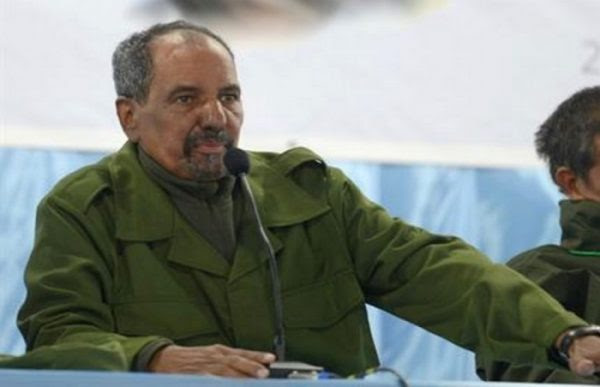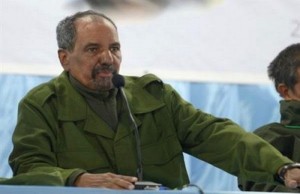The News Nigeria
By Rasheed Akinkuolie
The Western Sahara or Saharoui, Spanish Sahara, Moroccan Sahara, SADR were different names at different times given to this highly disputed territory in West Africa. The controversy of sovereignty over Western Sahara is still ongoing, whereas, it ought to have ended with Spanish de-colonization and departure in 1976.
A new dispute emerged soon after which pitched the Alaouite Kingdom of Moroco against the Polisario Liberation Front (PLF) backed by Algeria over sovereignty over the Western Sahara. The latter had declared the territory a sovereign Saharaoui Arab Democratic Republic (SADR). Morocco had on the other hand granted autonomy to Saharaoui or Western Sahara as a province within the kingdom based on the fact that it had for over a century contested sovereignty over the territory with Spain long before the formation of the PLF in 1973.
Western Sahara has a land mass of about 250,000 square kilometers, which is about the land mass of the United Kingdom of Great Britain and a quarter the size of Nigeria. The sparse population of about 500,000 people live mainly in Al Fayoun , the capital and other coastal settlements along the Atlantic Coast. The coastal waters teem with marine resources (fruits de la mer) proven deposits of phosphate in the hinterland and most likely oil deposits in the desert. The rest of the country is desert wilderness inhabited by Berber or Amazigh tribes, who have, for centuries like their ancestors, traversed the Sahara Desert in caravans to distant lands in The Middle East and Africa.
The Maghreb countries along the Mediterranean Sea have had chequered history of occupation and colonization which started with the Roman Empire of antiquity and much later from the 18th century by Italian, French, Spanish and Portugese colonial empires.
France annexed Algeria and placed Morocco under its protectorate. Italy annexed Libya, Spain annexed Western Sahara. The colonization of these territories had consistently been resisted by the indigenous Berber tribes led by Morocco.
The first conflict between Spain and Morocco over Western Sahara was the Tetuan War of 1859-60, followed by the Mellila war of 1893-1894, the Rif war of 1909-1927 and the Ifni war of 1957-58 after which Morocco and Spain signed the treaty of Angra de Citra. Spain retained Western Sahara and Sidi Ifni, while the region of Tarfaya was returned to Morocco.
The persistent pressures on Spain to relinquish control over the Western Sahara continued and it was after Morocco threatened to regain the territory by force of arms, that Spain signed the treaty of Madrid with Morocco and Mauritania and left the territory in 1976.
Morocco immediately took over Western Sahara, an action which technically was within the context of the Angra de Citra treaty of 1958, which withheld Western Sahara from Morocco. Spain had continued to occupy Ceuta and Mellila in North Eastern Morocco.
The coalition forces which confronted Spain during the Ifni war of 1958 included Berber tribes in Western Sahara and other interest groups. The agitations for decolonization thereafter was joined by The Polisario Liberation Front (PLF) which was formed in 1973 by Mustafa Sayed and The Saharaoui National Union Party (SNUP) founded in 1974 by Khalelina Ould Errachid with the objective of ousting Spain out of Western Sahara.
When Spain finally left the territory in 1976, the PLF declared Western Sahara as an independent Saharaoui Arab Democratuc Republic (SADR). SNUP on the other hand aligned with Morocco to govern Western Sahara as an autonomous province of Morocco.
In 2006, as a compromise, the king of Morocco created the Royal Advisory Council for Saharaoui Affairs (CORCAS) to run the administration of Saharaoui as an autonomous province. Khalelina Ould Errachid was appointed to head the council and the father of the late SADR President, Mohammed Abdelazeez was a member.
The presence of these important Saharaoui tribal leaders in CORCAS shows that the PLF did not enjoy critical and total support in Saharaoui. The international community is now faced with two divergent positions on the status of Saharaoui, to go autonomy or be granted independence. The fact that PLF opted for independence after the departure of Spain from the territory in 1976, a few years after the organization was formed in 1973 is a food for thought , whereas the conflicts to free the territory from Spanish occupation started over a century earlier.
The ambitious and separatist tendencies of the PLF and divergent opinions in Saharaoui would eventually lead to fresh conflicts which will destabilize the region with each faction drawing external supports. The example of South Sudan is still on going without an end in sight.
The referendum option which had been suggested is already time bad, too late and complicated to implement because of the influx of people and the mixed population. It will be almost impossible to determine the eligibility of voters 40 years after the departure of Spain. The result of the referendum is likely to be rejected by the party that lost under the pretext that it was rigged.
The situation on the ground is almost cast in iron and the way out is to find the most appropriate solution which will serve the best interest of the Saharaoui people who are pawns in the power game of supremacy between Morocco, PLF and Algeria. The conflict over Saharaoui is in essence a proxy war of supremacy between Morocco and Algeria. The two countries have fought two bloody wars over the territory and the resolution of the unhealthy rivalry between them would be a giant step in the eventual resolution of the larger Saharaoui crisis. This should be done under the auspices of the African Union with emphasis on economic cooperation before the more contentious political issues are broached.
The desire of Algeria to have access to the Atlantic Ocean in its southern borders can easily be achieved through bilateral discussions with Morocco which has access to the Atlantic within its territory and Saharaoui. The de facto situation in Saharaoui territory must be acknowledged and the best option is to work within the context of the letter and spirit of CORCAS’s constitution. The autonomy policy must be credible and transparent with a plan of action which will place emphasis on education, medical services, industrialization and agriculture. The rapid development of Saharaoui with job opportunities will reduce agitations for independence and attract refugees from the camps in Tindouf.
Ambassador Akinkuolie Rasheed was the Director of Trade and Investment in Nigeria’s Ministry of Foreign Affairs.
— akinkuolie.rasheed@gmail.com




